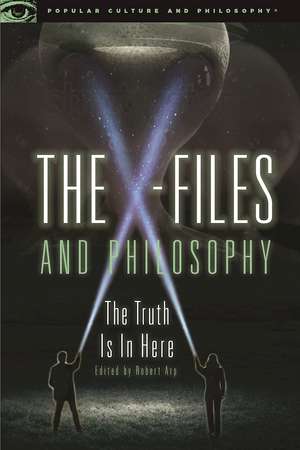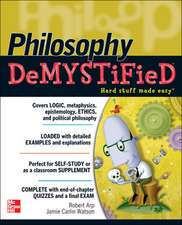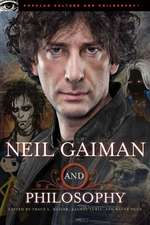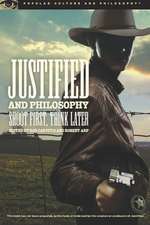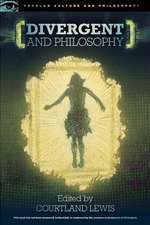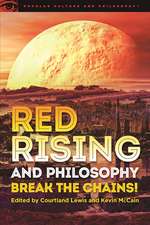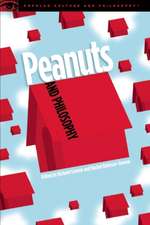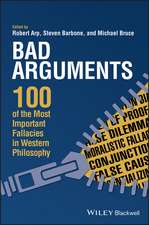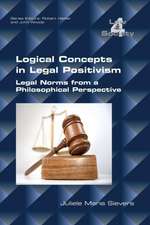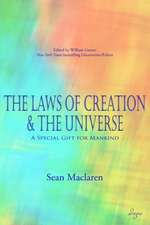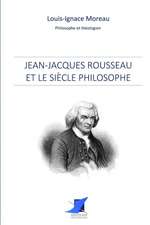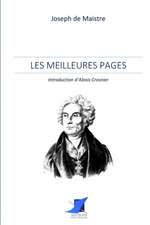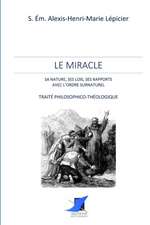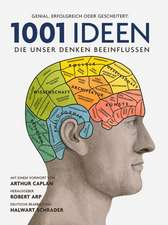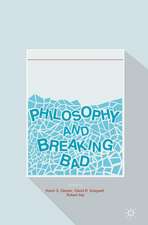The X-Files and Philosophy: The Truth Is in Here: Popular Culture and Philosophy, cartea 108
Editat de Robert Arpen Limba Engleză Paperback – 9 mai 2017
The X-Files took the risky step of having two FBI agents investigate those tall tales recounted in The National Enquirer and in sensational conspiracy theories, and believed in by millions of people, but not usually by the most conventional minds. These stories, in the world of The X-Files, are generally found to be true—or else the truth is even more bizarre and improbable than the modern legends themselves.
In The X-Files and Philosophy, thirty-six fearless philosophers seek for the truth which is out there, in here, at least somewhere, or (as the postmodernists claim) nowhere. One big issue is whether the weird and unexplained happenings, including the existence of entities unknown to traditional science, could or might really exist. And if they did, what would be the right and proper way to behave towards them? Some of these entities seem to flout conventional laws of nature—but perhaps we need to allow for different, as yet undiscovered, laws. If such fabulous entities really exist, what do we owe them? And if they don’t exist, why do we imagine they do?
In The X-Files, regular science is represented by Scully and usually turns out to be wrong, while open-minded credulity or pseudoscience is represented by Mulder and usually turns out to be right, or at least somehow on the right track. Scully demands objective, repeatable evidence, and she usually gets it, with Mulder’s help, in astounding and unwelcome ways. What lessons should we take from the finding of The X-Files that respectable science is nearly always wrong and outrageous speculative imagination nearly always right? Can fantastic, seemingly impossible happenings be explained by our limited human knowledge? Is reality far more diverse than we suppose, and if so, why do those in power always try to conceal and suppress this fact?
Weird and unexplained events are often pooh-poohed by the government and the media, giving rise to suspicions that there is a conspiracy of powerful interests to keep the truth from coming out. But what makes a conspiracy theory? Are people inclined to imagine conspiracies where they don’t exist? And what are the rules for distinguishing real-life conspiracies from nonexistent imaginary ones?
Are Scully and Mulder exemplary moral characters? Do they always pursue the truth in the most effective way? If they ever do have the opportunity to make definite contact with intelligent aliens, should they initiate communication? When is it morally okay for humans to experiment on other humans or on aliens, and for aliens to experiment on humans? Should Mulder want to believe or is this an ethical lapse? Do we need faith as well as science?
Can machines become conscious? If so, can they be blamed and punished for what they do? Is Artificial Intelligence a danger to humans? What does The X-Files tell us about the things that fascinate us and make us afraid? Why do we find these stories about hidden truths and hidden motives so appealing as fiction?
If we encounter highly developed aliens, should we regard them as our natural leaders and rulers? Does The X-Files encourage bad ways of thinking about science and human problems? Since we all allow our governments to keep secrets from us, do we really believe that commitment to the truth is merely a sham?
There may be more things in heaven and earth than are dreamed of in science, but, as this book shows, there are not more things in heaven and earth than are dreamed of in philosophy.
In The X-Files and Philosophy, thirty-six fearless philosophers seek for the truth which is out there, in here, at least somewhere, or (as the postmodernists claim) nowhere. One big issue is whether the weird and unexplained happenings, including the existence of entities unknown to traditional science, could or might really exist. And if they did, what would be the right and proper way to behave towards them? Some of these entities seem to flout conventional laws of nature—but perhaps we need to allow for different, as yet undiscovered, laws. If such fabulous entities really exist, what do we owe them? And if they don’t exist, why do we imagine they do?
In The X-Files, regular science is represented by Scully and usually turns out to be wrong, while open-minded credulity or pseudoscience is represented by Mulder and usually turns out to be right, or at least somehow on the right track. Scully demands objective, repeatable evidence, and she usually gets it, with Mulder’s help, in astounding and unwelcome ways. What lessons should we take from the finding of The X-Files that respectable science is nearly always wrong and outrageous speculative imagination nearly always right? Can fantastic, seemingly impossible happenings be explained by our limited human knowledge? Is reality far more diverse than we suppose, and if so, why do those in power always try to conceal and suppress this fact?
Weird and unexplained events are often pooh-poohed by the government and the media, giving rise to suspicions that there is a conspiracy of powerful interests to keep the truth from coming out. But what makes a conspiracy theory? Are people inclined to imagine conspiracies where they don’t exist? And what are the rules for distinguishing real-life conspiracies from nonexistent imaginary ones?
Are Scully and Mulder exemplary moral characters? Do they always pursue the truth in the most effective way? If they ever do have the opportunity to make definite contact with intelligent aliens, should they initiate communication? When is it morally okay for humans to experiment on other humans or on aliens, and for aliens to experiment on humans? Should Mulder want to believe or is this an ethical lapse? Do we need faith as well as science?
Can machines become conscious? If so, can they be blamed and punished for what they do? Is Artificial Intelligence a danger to humans? What does The X-Files tell us about the things that fascinate us and make us afraid? Why do we find these stories about hidden truths and hidden motives so appealing as fiction?
If we encounter highly developed aliens, should we regard them as our natural leaders and rulers? Does The X-Files encourage bad ways of thinking about science and human problems? Since we all allow our governments to keep secrets from us, do we really believe that commitment to the truth is merely a sham?
There may be more things in heaven and earth than are dreamed of in science, but, as this book shows, there are not more things in heaven and earth than are dreamed of in philosophy.
Din seria Popular Culture and Philosophy
-
 Preț: 159.62 lei
Preț: 159.62 lei -
 Preț: 187.62 lei
Preț: 187.62 lei -
 Preț: 110.08 lei
Preț: 110.08 lei -
 Preț: 192.69 lei
Preț: 192.69 lei -
 Preț: 143.29 lei
Preț: 143.29 lei -
 Preț: 109.10 lei
Preț: 109.10 lei -
 Preț: 89.60 lei
Preț: 89.60 lei -
 Preț: 164.76 lei
Preț: 164.76 lei -
 Preț: 160.85 lei
Preț: 160.85 lei -
 Preț: 181.89 lei
Preț: 181.89 lei -
 Preț: 181.45 lei
Preț: 181.45 lei -
 Preț: 159.62 lei
Preț: 159.62 lei -
 Preț: 158.58 lei
Preț: 158.58 lei -
 Preț: 110.08 lei
Preț: 110.08 lei - 20%
 Preț: 168.08 lei
Preț: 168.08 lei -
 Preț: 102.20 lei
Preț: 102.20 lei -
 Preț: 198.85 lei
Preț: 198.85 lei -
 Preț: 102.46 lei
Preț: 102.46 lei -
 Preț: 159.62 lei
Preț: 159.62 lei -
 Preț: 180.25 lei
Preț: 180.25 lei -
 Preț: 112.18 lei
Preț: 112.18 lei -
 Preț: 105.34 lei
Preț: 105.34 lei -
 Preț: 142.47 lei
Preț: 142.47 lei -
 Preț: 144.34 lei
Preț: 144.34 lei -
 Preț: 211.14 lei
Preț: 211.14 lei -
 Preț: 181.45 lei
Preț: 181.45 lei -
 Preț: 145.38 lei
Preț: 145.38 lei -
 Preț: 110.08 lei
Preț: 110.08 lei -
 Preț: 160.63 lei
Preț: 160.63 lei -
 Preț: 156.53 lei
Preț: 156.53 lei -
 Preț: 102.46 lei
Preț: 102.46 lei -
 Preț: 148.89 lei
Preț: 148.89 lei -
 Preț: 199.93 lei
Preț: 199.93 lei -
 Preț: 182.56 lei
Preț: 182.56 lei -
 Preț: 144.34 lei
Preț: 144.34 lei -
 Preț: 113.19 lei
Preț: 113.19 lei -
 Preț: 193.79 lei
Preț: 193.79 lei -
 Preț: 113.60 lei
Preț: 113.60 lei -
 Preț: 111.14 lei
Preț: 111.14 lei -
 Preț: 130.71 lei
Preț: 130.71 lei -
 Preț: 110.08 lei
Preț: 110.08 lei -
 Preț: 102.20 lei
Preț: 102.20 lei -
 Preț: 181.45 lei
Preț: 181.45 lei -
 Preț: 198.85 lei
Preț: 198.85 lei -
 Preț: 107.19 lei
Preț: 107.19 lei -
 Preț: 110.08 lei
Preț: 110.08 lei -
 Preț: 103.78 lei
Preț: 103.78 lei -
 Preț: 142.30 lei
Preț: 142.30 lei -
 Preț: 113.19 lei
Preț: 113.19 lei -
 Preț: 143.29 lei
Preț: 143.29 lei
Preț: 211.14 lei
Nou
Puncte Express: 317
Preț estimativ în valută:
40.40€ • 42.29$ • 33.63£
40.40€ • 42.29$ • 33.63£
Carte disponibilă
Livrare economică 10-24 martie
Preluare comenzi: 021 569.72.76
Specificații
ISBN-13: 9780812699586
ISBN-10: 0812699580
Pagini: 288
Dimensiuni: 152 x 229 mm
Greutate: 0.5 kg
Editura: Open Court
Colecția Open Court
Seria Popular Culture and Philosophy
ISBN-10: 0812699580
Pagini: 288
Dimensiuni: 152 x 229 mm
Greutate: 0.5 kg
Editura: Open Court
Colecția Open Court
Seria Popular Culture and Philosophy
Notă biografică
Robert Arp holds a Ph.D. in Philosophy. He is the author of Scenario Visualization (2008) and co-author of three books including What's Good on TV (2011) and Philosophy DeMYSTifieD (2001). He is the editor of 1001 Ideas that Changed the Way We Think (2013) and co-editor of at least a dozen other books, including Batman and Philosophy (2008), South Park and Philosophy: You Know I Learned Something Today (2006), Breaking Bad and Philosophy (2012), and Downton Abbey and Philosophy.
